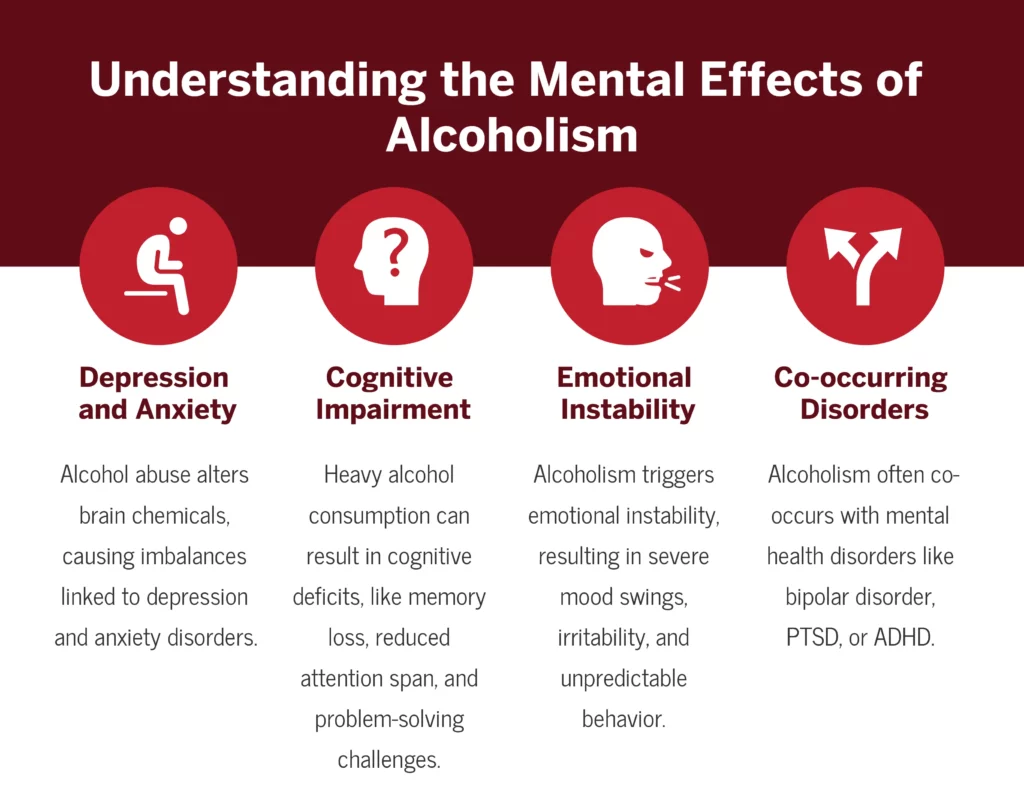Alcoholism, a chronic and often progressive illness marked by a persistent pattern of excessive and compulsive alcohol consumption, poses a profound and multifaceted toll on an individual’s mental health. A 2021 National Survey on Drug Use and Health (NSDUH) reports that 29.5 million individuals aged 12 and upwards experienced Alcohol Use Disorder (AUD) during the previous year. This significant prevalence underscores the need to examine alcoholism’s far-reaching effects beyond the commonly understood physical consequences. Crucially, the mental effects of alcoholism can be as damaging as, if not more than, its physical ramifications.
This article aims to delve into the complexities of these mental impacts, exploring everything from acute cognitive impairments to chronic alterations in personality and mood, the intersection of alcoholism with other mental disorders, and the available pathways for recovery and rehabilitation.

Burning Tree Ranch Offers the Best Long Term Dual Diagnosis Treatment for the Chronic Relapser
The Brain and Alcohol
Alcohol, a central nervous system depressant, impacts the brain’s functioning by altering the balance of neurotransmitters — the chemical messengers responsible for transmitting signals across brain cells, regulating various physical and mental functions. The most noticeable effects of alcohol consumption result from its action on two crucial neurotransmitters: GABA (gamma-aminobutyric acid) and glutamate. Alcohol increases the inhibitory effects of GABA, slowing down brain activity while reducing the excitatory effects of glutamate, further contributing to the depressant effect.
Short-term Effects of Alcohol on the Brain
Even in small quantities, alcohol can lead to noticeable short-term changes in the brain’s functioning. It typically begins with a sense of relaxation and euphoria as the depressant affects lower inhibitions. As blood alcohol concentration increases, cognitive functions such as judgment, memory, and coordination start to deteriorate, leading to impaired decision-making, possible blackouts, and increased risk of accidents due to the loss of motor control. The short-term effects can also include mood changes, from exaggerated emotions and behaviors to aggressive tendencies.
Long-term Effects of Alcohol on the Brain
Prolonged heavy drinking can lead to lasting changes in the brain’s structure and function. It can result in a condition known as alcohol-related brain damage (ARBD), which encompasses a range of disorders, such as Wernicke-Korsakoff syndrome (a condition characterized by severe memory impairment) and alcoholic dementia. Over time, alcohol can also shrink brain tissue, disrupt the development of new brain cells, and cause significant changes in the brain’s chemistry, leading to long-term cognitive impairments, difficulty with motor coordination, and significantly heightens the risk of developing mental health disorders, including anxiety and depression. The severity and type of these effects can vary greatly, depending on factors like the amount and frequency of alcohol consumption, the individual’s overall health, genetics, and co-occurring mental health conditions.
Understanding the Mental Effects of Alcoholism
Alcoholism takes a tremendous toll on an individual’s mental well-being. The effects can vary from person to person, but common mental health issues associated with alcoholism include:

Depression and Anxiety
Alcohol abuse disrupts the delicate balance of brain chemicals, leading to imbalances that contribute to the development of depression and anxiety disorders. These mental health conditions often coexist with alcoholism and can exacerbate its effects. Our treatment programs integrate therapies that address both alcohol addiction and mental health disorders, offering a comprehensive approach to recovery.
Cognitive Impairment
Excessive alcohol consumption can cause significant cognitive impairments, such as memory loss, decreased attention span, and difficulties with problem-solving. These impairments can affect various aspects of daily life, including work performance, relationships, and overall quality of life. Our tailored treatment plans incorporate cognitive rehabilitation techniques to help individuals restore cognitive function and enhance mental clarity.
Emotional Instability
Alcoholism can lead to emotional instability, causing intense mood swings, irritability, and unpredictable behavior. This volatility often strains relationships with loved ones and hampers social interactions. Our compassionate treatment team offers therapeutic interventions, including individual and group counseling, to assist individuals in managing their emotions effectively and fostering healthier interpersonal connections.
Co-occurring Disorders
Alcoholism frequently co-occurs with other mental health disorders, such as bipolar disorder, post-traumatic stress disorder (PTSD), or attention deficit hyperactivity disorder (ADHD). Our integrated treatment model recognizes the interconnectedness of these conditions and provides specialized care that addresses the specific needs of individuals with co-occurring disorders. By employing evidence-based therapies tailored to each person’s unique circumstances, we help individuals achieve lasting recovery.
Dual Diagnosis Treatment at Burning Tree Ranch
At Burning Tree Ranch, our approach to dual diagnosis treatment is thorough, compassionate, and innovative. Acknowledging the complex interplay between substance addiction and mental health disorders, we ensure our treatment plans are tailored to address the entirety of an individual’s experiences. Our team of professionals employs evidence-based therapeutic strategies, like Cognitive Behavioral Therapy and Dialectical Behavioral Therapy, designed to unravel the intricate ties between co-occurring disorders. These therapies are bolstered by our holistic wellness initiatives, such as yoga and meditation, ensuring a well-rounded healing process.
Our commitment to long-term recovery goes beyond merely treating symptoms – we strive to equip each individual with the necessary skills and strategies for a lifetime of sobriety and mental well-being. At Burning Tree Ranch, we believe in total healing and embrace the journey to recovery every step of the way.





